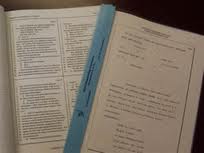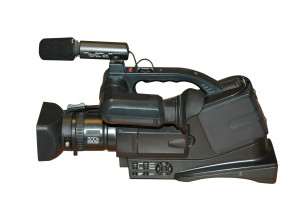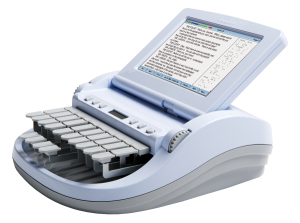 When you hire a court reporter, sometimes you’re working with a stenographic reporter who brings a shorthand machine to take down the record. Sometimes you may get an audio recorder, someone who is using a recording device rather than using a steno machine. Have you ever wondered if one is better than the other?
When you hire a court reporter, sometimes you’re working with a stenographic reporter who brings a shorthand machine to take down the record. Sometimes you may get an audio recorder, someone who is using a recording device rather than using a steno machine. Have you ever wondered if one is better than the other?
In my experience, stenographic court reporters produce superior transcripts to tape recorders and I only hire stenographic reporters. I have found there are many situations that may arise in which a tape recorder will not be able to create a record as accurately as a stenographic court reporter.
The biggest difference between a court reporter’s record and an audio recorder is that a court reporter takes down every word, whereas a tape recorder reproduces sound. There are a number of situations that may arise during a deposition that make capturing the record difficult. This difference in process means the outcome is sometimes different for a tape recorder versus a stenographic court reporter. Here are some of those situations.
Inaudible Portions of the Record
Often, there are circumstances where background noise makes it impossible to hear every word that is being spoken. This can happen when there is, for instance, a book being dropped on a table, coughing, papers rustling, a fan turning on in the room, or multiple parties speaking at the same time.
With a tape recording, the transcript will sometimes contain the notation “inaudible”. These are areas of the proceedings in which the recording did not pick up enough digital information to be fully transcribed. If the inaudible portion of an answer is key to your case, you’ve missed the opportunity to capture it in the transcript, and you won’t know it until days later when you receive the transcript.
In the same circumstance with multiple speakers or background noises, a court reporter knows immediately if he or she is missing what’s being spoken. A court reporter will always stop the proceedings and ask that testimony be repeated to ensure a complete and accurate record is being made. You will not find the “inaudible” notation in the transcript of a deposition taken by a stenographic court reporter.
Witnesses with Accents
A witness with an accent can be a challenge for both stenographic reporters and tape recorders. There are big differences in the way this situation is handled.
A transcript produced from a tape recording is sometimes transcribed by a transcriptionist who was not present during the deposition. This puts the transcriptionist at a disadvantage when transcribing testimony of a witness with a thick accent. If there are words or phrases that are difficult to discern, a transcriptionist will not have the opportunity to ask the witness to repeat the answer. This will again result in a portion of the transcript that will show as “inaudible” or just simply be inaccurate.
A stenographic reporter has the opportunity to stop the proceedings as many times as he or she finds necessary to ask the witness to repeat an answer. The stenographic reporter will not allow the proceedings to move forward until she or he is certain the answer was captured accurately in the record.
Reading Testimony Back During the Deposition
Another area of difference is when a portion of the record needs to be read back during the proceedings.
A tape recording is not easy to scan to find just the spot you would like to have replayed. It can be cumbersome and time consuming to wait for a recorder to review the tape to find the portion you want played.
With a stenographic reporter, if you need part of the record read back during the deposition, you simply ask your court reporter and she can visually scan her notes and quickly find the portion you would like read.
Expedited Draft Transcripts
There are times when you need a rough draft of the transcript as soon as possible so you can use it in your case preparation.
A tape recording does not allow for quick turn-around time on a rough draft transcript. The transcript is only in digital audio format until it is transcribed to text, which will likely take days.
Because stenographic reporters use computers to instantly translate steno notes to English, this means they can often provide you with a rough draft of the transcript within a few hours of the conclusion of the proceeding and oftentimes sooner.
Realtime Translation of the Testimony
There are times when it is very helpful to see the testimony as it is being given. A stenographic court reporter can use realtime translation, instantly translating steno notes to English. Viewing the written transcipt in realtime allows you to judge whether the answer given is coherent when translated to text. If it seems unclear, you have the chance to immediately clear up any ambiguities that may have arisen.
With a tape recorder, you will not have this opportunity to view the written text seconds after the words are spoken. Only a stenographic reporter can provide you this opportunity.
Streaming Realtime Testimony over the Internet, with or without Video
Let’s say you have an expert in another state – the cost of bringing an expert to a deposition would cost much more than having the expert at their office following along with the deposition via computer. With a realtime streaming capable reporter, the expert, or your associates back at your office, can see and hear the testimony as it is actually proceeding and can “talk” with the attorney conducting the deposition via private chat when they have a comment or question relevant to their case.
A tape recorder will not be able to provide this instantaneous translation be streamed via the internet to remote locations. Much more time and expense will need to be spent to bring your expert to the location of the deposition and hear the testimony as it happens.
By becoming aware of these differences in how the record is produced, you will be able to ensure you are hiring someone who will produce the best transcript of your deposition. When you are scheduling a deposition, ask whether the transcript will be taken down with a stenographic machine or a tape recorder. Let the agency know which is your preference.
To schedule a deposition with a stenographic court reporter, see our online Deposition Scheduler.
 Having participated in many video depositions, we are often asked if we have any tips for preparing a witness for video. When planning our video deposition, here are a few areas you may want to consider.
Having participated in many video depositions, we are often asked if we have any tips for preparing a witness for video. When planning our video deposition, here are a few areas you may want to consider. Finding and hiring a good court reporter is essential for an accurate record of a witness’ testimony. Here are a few simple things to take into consideration before you call a court reporter to schedule a deposition.
Finding and hiring a good court reporter is essential for an accurate record of a witness’ testimony. Here are a few simple things to take into consideration before you call a court reporter to schedule a deposition. If you have not yet used video in your legal depositions, it’s time to consider the many benefits that you can derive from this technology.
If you have not yet used video in your legal depositions, it’s time to consider the many benefits that you can derive from this technology. Streaming Realtime Transcription: Definition: The term for transcription by court reporters to deliver computer text, audio and video of speech within seconds of the words being spoken.
Streaming Realtime Transcription: Definition: The term for transcription by court reporters to deliver computer text, audio and video of speech within seconds of the words being spoken.